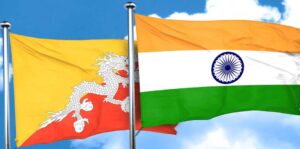Published on: December 18, 2021
INDIA – BHUTAN
INDIA – BHUTAN
NEWS
Bhutan confers its highest civilian award , Ngadag Pel gi Khorlo on PM of India
INDO-BHUTAN BILATERAL RELATIONSHIP
IN THE HISTORY
- Bhutan came under the British suzerainty in 1865. It signed the ‘Treaty of Punakha’ with the British in 1910, which set the stage for any future contact between the two countries after the British left the subcontinent.
- After India’s independence in 1947, standstill agreements with Sikkim, Nepal and Tibet were signed to continue existing relations until new agreements were made.
- India’s and Bhutan had a Political Officer based in Sikkim. This continued until 1948 and was revised later
- The basic framework of India- Bhutan bilateral relations was the Treaty of Friendship and Cooperation signed in 1949 between the two countries.
- Diplomatic relations between India and Bhutan were established in 1968 with the establishment of a special office of India in Thimphu.
- India and Bhutan shares a 699 Kilometers border and a deep religion-cultural links. Buddhism and deepening traditional ties between people in both nations with Guru Padmasambhava playing an influential role
- The Golden Jubilee of the establishment of formal diplomatic relations between India and Bhutan was been celebrated in the year 2018.
- India and Bhutan share traditionally warm and friendly relationship which is relatively trouble free when compared with other South Asian
- The two countries have always shared a unique and organic relationship which is often termed as a ‘sacred bond’, largely sustained by regular high level visits and dialogues between the neighbors.
- Bhutan has been central to India’s two major policies – the ‘Neighborhood First Policy’ and the ‘Act-East Policy’.
BHUTAN’S SIGNIFICANCE TO INDIA
Bhutan
- Shares border with four Indian States: Assam, Arunachal Pradesh, West Bengal and Sikkim.
- Serves as a buffer between India and China.
- Provides a market for Indian commodities and is a destination for Indian investment along with providing boost to the trade between two countries.
- Rich source of hydropower which can fulfill India’s need of resources.
- If unstable , can provide a safe haven to anti-India activities and anti-India militant groups.
- Has never played the China card against India unlike Nepal which always threatens for the same.
- Has repeatedly turned down Chinese ‘package deal’ offers making bigger territorial concessions to Bhutan in return for the smaller Doklam area (remaining sensitive to India’s security concerns in the area).
- Effort to drive out ULFA rebels was of a great significance.
- Happiness index which is adopted by India (Madhya Pradesh) also is a great initiative learnt from Bhutanese.
AREAS OF COOPERATION
- Areas – security, border management, trade, transit, economic, hydro-power, development cooperation, water resources.
- India has pledged to assist Bhutan in developing at least 10,000 MWs of hydropower and import the surplus electricity to India by 2020.
- Inauguration of the 720 MW Mangdechhu hydropower plant which is of great significance for both the countries.
- Open borders, close alignment and consultation on foreign policy, and regular, open communications on all strategic issues are the hallmark of the relationship that has maintained its consistency for the past many decades.
- Bhutan’s unequivocal support to India on strategic issues has meant a lot to India on the international stage and at the United Nations.
- India is Bhutan’s largest trading partner. Major exports from India to Bhutan are mineral products, machinery and mechanical appliances, electrical equipments etc. whereas major items of import from Bhutan are electricity, ferrosilicon, Portland cement etc.
- Both of them also share other multilateral forums such as BBIN (Bangladesh, Bhutan, India, and Nepal), BIMSTEC.

